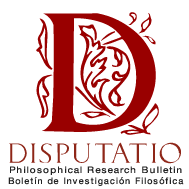Sybren Heyndels
Katholieke Universiteit Leuven, Belgium | sybren.heyndels@kuleuven.be
Received: 1-June-2018 | Accepted: 12-October-2018 | Published: 30-June-2019
Disputatio [Jun. 2019], Vol. 8, No. 9, pp. 00-00 | DOI: 10.5281/zenodo.3242075
Article | [EN] | Full Text | Statistics | Copyright Notice [es] | Vol. 8 No. 9
How to cite this article:
Heyndels, Sybren (2019). «A Regress of Justification? Brandom and Wittgenstein on Certainty and Reasonable Doubt». Disputatio. Philosophical Research Bulletin 8, no. 9: pp. 00-00.
Abstract | In order to ward off the global threat of a regress of justification, Brandom argues that some claims in our linguistic practices must be treated as “innocent until proven guilty’, i.e. participants must be treated as prima facie entitled when making them. Examples he gives include claims such as “There have been black dogs” and “I have ten fingers”. Brandom calls this idea “the default and challenge structure of entitlement” (Brandom 1994, p. 177). In On Certainty, Wittgenstein argues that there are basic certainties (“hinge propositions” or “hinges”) such as “The world existed long before I was born” (OC §84) or “This is a tree” (OC §467) that cannot be meaningfully doubted because they provide the basic frameworks for our language–games in the first place. The aim of this article is threefold. First, it offers an understanding of Brandom’s philosophical project in the light of Wittgenstein’s On Certainty. Secondly, it shows how Brandom may help to elucidate some of the more mysterious passages in Wittgenstein’s “third masterpiece”. Thirdly, it outlines a sketch of a promising solution to an old philosophical riddle.
Keywords | Certainty · Scepticism · Regress of Justification.
![]()
¿Una regresión de justificación? Brandom y Wittgenstein sobre la certeza y la duda razonable
Resumen | Para prevenir una amenaza generalizada de una regresión de justificación, Brandom arguye que algunas aseveraciones en nuestras prácticas lingüísticas se tienen que tratadas como «inocentes hasta mostradas culpables», es decir, a los participantes hay que tratarlos como prima facie facultados cuando las presentan. Los ejemplos que él da incluyen aseveraciones como «había perros negros» y «tengo diez dedos». Brandom llama esta idea «la estructura por defecto y por reto de derecho» (Brandom 1994, p. 177). En Sobre la certeza [OC] Wittgenstein arguye que hay certezas básicas («proposiciones bisagra» o «bisagras») como «el mundo ha existido desde hace mucho antes de mi nacimiento» (OC § 84) o «esto es un árbol» (OC § 467) que no pueden ser puestas en duda significativamente porque ellas suministran el entramado básico para nuestros juegos de lenguaje antes que nada. El objetivo de este artículo es triple: primero ofrece una comprensión del proyecto filosófico de Brandom a la luz de Sobre la certeza de Wittgenstein. En segundo lugar muestra cómo Brandom podría estar ayudando a aclarar algunos de los pasajes más bien misteriosos en la «tercera obra maestra» de Wittgenstein. En tercer lugar, esboza un borrador de una solución prometedora para un antiguo enigma filosófico.
Palabras Clave | Certeza · Escepticismo · Regresión de justificación.
References
Brandom, Robert (1994). Making it Explicit: Reasoning, Representing and Discursive Commitment. Cambridge, MA: Harvard University Press.
Brandom, Robert (2008). Between Saying and Doing: Towards an Analytic Pragmatism. Oxford: Oxford University Press. doi: https://doi.org/10.1093/acprof:oso/9780199542871.001.0001
Moyal–Sharrock, Danièle and William H. Brenner (ed.) (2005). Readings of Wittgenstein’s On Certainty. Basingstoke: Palgrave MacMillan. doi: https://doi.org/10.1057/9780230505346
Williams, Michael (2015). “The Agrippan Problem, Then and Now”. International Journal for the Study of Skepticism vol. 5, no. 2: pp. 80–106. doi: https://doi.org/10.1163/22105700-04031179
Wittgenstein, Ludwig (1975). On Certainty [OC]. Ed. Gertrude Elizabeth Margareth Anscombe and G. H. von Wright. Trans. Denis Paul and G.E.M.Anscombe. Oxford: Blackwell
Wittgenstein, Ludwig (2009). Philosophical Investigations [PI]. Ed. Gertrude Elizabeth Margareth Anscombe, Peter Michael Stephen Hacker, and Joachim Schulte. Oxford: Wiley–Blackwell.
© The author(s) 2019. This work, published by Disputatio [www.disputatio.eu], is an Open Access article distributed under the terms of the Creative Commons License [BY–NC–ND]. The copy, distribution and public communication of this work will be according to the copyright notice. For inquiries and permissions, please email: boletin@disputatio.eu.
